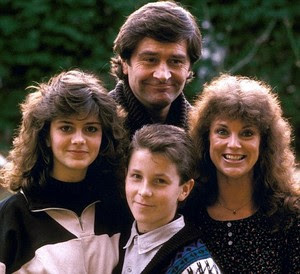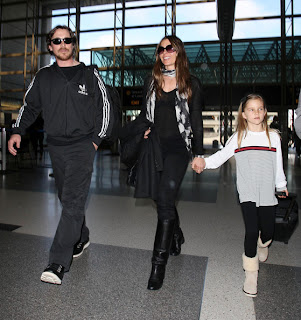Could An Indulged Childhood and Youth Be Behind Christian Bale's Reputed Rants?
Christian Bale: The Inside Story of the Darkest Batman
By Harrison Cheung & Nicola Pittman
Book Review by BeansTalk
(In the interest of full-disclosure, BeansTalk is not without association to this biography; not only are we acquainted with all the principals – save for co-author Pittman and Bale’s wife, Sibi – we did write a forward for the book, that while not in the “Advance Copy,” may very well appear in a future edition.)
Despite the unwieldy title (which remains hard to remember), this compact tome neatly compiles the to-date career of Oscar-winning actor Christian Bale, once best remembered for (depending on your age) his impressive debut, at 13, in Steven Speilberg’s “Empire of the Sun” [1987] the crushable “Laurie” in friend and associate Winona Ryder’s “Little Women” [1994] or the gravely voiced “Dark Knight” [2008].
Then again, there are news viewers who may have caught news reports of Bale’s famously followed fight (physical or not) with his mother Jenny and sister Sharon pre-premiere of “Dark Knight” in London, England or his jaw-dropping, swear-word laden dressing down of “Terminator: Salvation’s” Director of Photography, Shane Hurlbut.
However familiar with the “intensely private” actor, biography fans are likely to find Harrison Cheung’s telling of the behind-the-scenes career trajectory fascinating. This is a familiar rags-to-riches tale. Rather, the drama in the Bale family harkens much more towards the issues of dynastic politics and position-jockey-ing for the attention of the favored child, the only son.
 |
| Cheung and Bale, in happier times. |
Campaigning vigorously – professionally, personally and spiritually – was the titular assumed “head-of-the-family,” Bale’s father, the bigger-than-life David Bale (who later gained his bit of notoriety when he became the first – and so far only – husband of iconic feminist Gloria Steinem; he died of a brain tumor, in 2005).
 |
| Christian Bale's father, the late David Bale and David's third wife, the iconic Gloria Steinem |
If Cheung – who served the Bales for 10 years as PA, publicist, media liaison and something that closely resembles what used to be called a “step-and-fetchit “– is narrator Nick, it is not the actor Bale who is the book’s Gatsby, but Bale’s father, David.
 |
| Christian and David Bale. David's intense look embodies his feelings for his only son. |
As the story’s most fascinating and career engineer, David was charming, gentlemanly, tall, engaging and emphatic. David clearly emerges as the driving force, if not exactly behind Bale’s inherent talent, certainly for being Bale’s unrelenting, always impassioned support system.
 |
| L to R: Louise, David, Christian and Jenny Bale (missing are Bale's sisters Erin and Sharon), the early days. |
It is also David Bale who provides the reader with the most entertainment. And, take it from this reviewer, who knew David, Cheung’s characterization is dead-on. Bale and his father’s tight bond resulted in Bale’s virtual isolation, not only, eventually, from nearly all of his family, but conventional human socialization.
 |
| Clockwise: Louise, Sharon, David, Jenny and Christian Bale, 1983. Nine years later, David and Jenny (his second wife), would divorce. |
If Bale appeared awkward and disheveled, on those rare public appearances, showing up on the red carpet wearing trainers and slacks, that’s because he was. Bale was (and may still be) content to cocoon himself in his home, surrounded only by a tightly select few people, and only venture out to work. In those early years in Southern California, David kept Bale isolated, and it may have evolved into the emotionally indulged Bale literally, and figuratively, lashing out when crossed.
Cheung narrates the tale, alternating between fact-filled financial data and stunned observer and participant. In a queer – and likely very unusual – twist of fate, Cheung was a fan whose correspondence with Bale (the son) eventually evolved into Bale (the father) contacting Cheung in his native Toronto, inviting the on-line marketing executive to their Manhattan Beach home to discuss the possibility of launching a marketing campaign in the naissance of the Internet.
For Bale (the son) who loathed publicity, and whose traumatic experience with “Empire’s” publicity junkets, left him hating any type of promotions, it was ideal. David was thrilled; the world would be reminded of his son’s “God-given talent.” Bale would have little or nothing to do. Moreover, David wouldn’t have to pester his reluctant son to be more visible (to both the industry and public). Internet publicity – especially in a time when it was a novelty – seemed to satisfy everyone involved.
 |
| Bale, Spielberg on the "Empire of the Sun" set |
Bale eventually became “the Internet’s biggest star,” and fiercely loyal fans – soon known as “Baleheads” quickly became familiar with Cheung, who monitored Bale’s fan boards as early as 1992.
 |
| Above, Bale in 1994's Little Women, below, 1992's Newsies and Swing Kids -- swoon-worthy roles that helped Bale -- and Cheung -- launch Bale's unprecedented internet popularity. |
 |
| Newsies |
 |
| Swing Kids |
When things between Bale and Cheung went pear-shaped and public and they parted ways – courtesy of a financial dispute -- Baleheads were quick to denounce Cheung, discounting his genuine10-year-stint working, uncompensated, for the Bales.
Still, those same disdainful “Baleheads” – who, if message boards and forum are to be believed, may assume the book is a poison-pen letter. Some “fans” (none of whom have read the book) have gone so far as to campaign against it. But they may be surprised by Cheung’s book. While not exactly an affectionate portrait, it is factual, often funny and quite credible.
No one could’ve predicted the chain of events, which found Cheung, albeit willingly and happily, moving to a new country, to work for, he soon realized, a mercurial, dysfunctional father-son duo.
While Bale had an agent – and, of course, his ever-present father -- he did not have an manager or publicist, rare in the Hollywood universe for an actor at Bale’s level. Cheung was shoe-horned into those and other roles. He took on the duties without a contract and on (what can now be characterized as naïve) faith. He considered himself a family friend – and David certainly described Cheung as such – but it was a “friendship” that might -- but didn’t, and should -- have given Cheung pause. Throughout his decade with the Bales, Cheung was convivially “glass half-full,” appropriately protective, unfailingly dedicated, and now, reluctantly admits, of his own free will.
Meaning, no matter how much one might admire talent, working for them is an entirely different story -- and one that often ends in disappointment (for more on this, see Rosemary Mahoney's excellent memoir, A Different Story: One Summer With Lillian Hellman or Sara Barron's People are Unappealing, Even Me, specifically, the chapter in which Barron describes working at a NYC restaurant pseudonymously dubbed "Hell," in which she encounters a personal hero, an iconic singer/songwriter dubbed "Twat Waffle" by her fellow waitstaff, and whom she insists must be different than the more experienced staff have encountered. Post publication of her book, Barron's TV chef/restauranteur, and his even-more famous music star were "outted"as more-than-likely Mario Batali and Michael Stipe, for which, even now, Barron refuses to confirm or comment on.)
With "Oscar-winner" preceding his name in perpetuity, Bale now seemingly shields himself from the outside world (appearing in public when absolutely necessary) and shrouds himself in what appears to be the cozy comfort of his wife of a dozen years, Sibi, and their daughter. He should, for all intents and purposes, be deliriously happy, with apparent success in both work and family. It's very unlikely that any circle, of which Bale is the nucleus, will now be broached. He's reached the pinnacle of fame that David envisioned for his son, and, no longer needs, what Bale never wanted: the marketing and promotion of himself as a brand.
This is not a cautionary tale (well, certainly not to anyone, but Cheung himself), but it is a well-written, concise, often funny, fact-filled, behind-the-scenes look at Bale’s life – and could very well be an unusual glimpse. Bale will never condone an official biography (unless, one can imagine, Sibi decided to write one) and he isn’t bloody likely to write an autobiography. So, Baleheads and curious fans, aspiring actors and assistants, if you’re looking for more information (I’d go so far as to even dub it “scoop”), from someone who was a member (even if low-ranking) of Bale’s inner circle, this may be your only chance.



